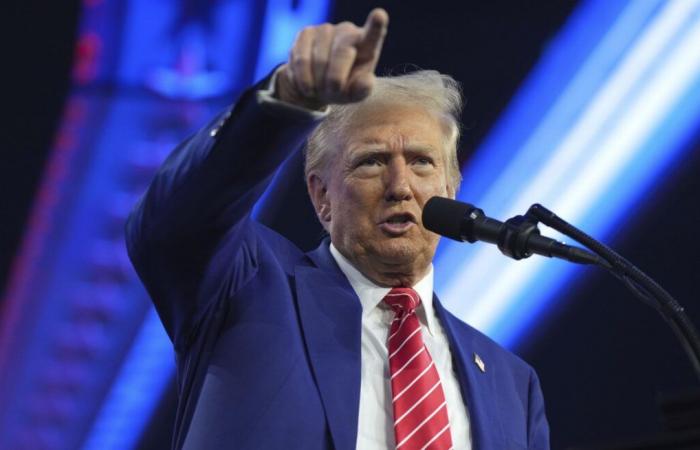The delicate diplomacy that Canada is trying to engage with the “Trump 2.0 administration” took a new turn on Monday when Prime Minister Justin Trudeau announced that he would resign from his post as soon as a new Liberal leader was chosen. .
Mr. Trudeau’s decision, while expected after weeks of mounting pressure from his own caucus, brings instability to Ottawa just as Canada tries to dispel Donald Trump’s threat to impose customs tariffs which would be devastating for the economy.
“To be quite frank, I don’t think a change in direction could come at a worse time in our bilateral relations,” said Fen Osler Hampson, professor of international affairs at Carleton University in Ottawa, on Monday. co-chair of the Panel of Experts on Canada-US Relations.
“We have a gun to our head with Donald Trump’s threats to impose 25% tariffs on Canada and Mexico. The key question is obviously: who speaks on behalf of Canada? »
No date for the Liberal leadership race has yet been set, but Mr. Trudeau also prorogued Parliament until March 24, and many expect a new leader to be in place before this date.
Mr. Trudeau said he would step down because internal conflict within his party over his leadership had become a distraction and Canadians deserved a clear choice in the next election.
The White House on Monday described Mr. Trudeau as a “faithful friend” of the United States. Spokeswoman Karine Jean-Pierre told reporters aboard Air Force 1 on Monday that President Joe Biden was grateful for Mr. Trudeau’s partnership and his “commitment to defending North America against geopolitical threats from 21e century “.
President-elect Donald Trump, however, responded to Mr. Trudeau’s announcement by saying that the prime minister was resigning because he knew the United States would not tolerate trade deficits with Canada. He also argued that many Canadians “would love” for Canada to become the 51e American state.
“The United States cannot endure the huge trade deficits and subsidies Canada needs to stay afloat,” Mr. Trump wrote on his Truth Social platform after the prime minister’s announcement in Ottawa.
“Justin Trudeau knew it and he resigned,” wrote Mr. Trump, who will take office at the White House in two weeks.
Mr. Trump also resumed his new rhetoric on a possible annexation of Canada to the United States, pleading that there would be no customs tariffs and that taxes would be lower in Canada. He also believes that Canadians “would be completely safe from the threats of Russian and Chinese ships which constantly surround them.”
“Together, what a great nation it would be!!! “, he concluded.
More threatening gestures
This reaction from Mr. Trump comes on the heels of his recurring efforts to provoke Mr. Trudeau and Canadians since his victory in last November’s election.
The president-elect has already called Mr. Trudeau the “governor” of Canada and he periodically repeats this “51” rhetoric.e State” since the Prime Minister came to meet him at his property in Mar-a-Lago, Florida, last November.
“Trump will take credit for everything and turn everything into an opportunity to make himself look better,” said Laura Dawson, an expert on Canada-US relations and director of the Future Borders Coalition, a bilateral organization.
Mr. Trump’s apparent jokes aside, the actions taken by the new president could have real consequences for Canada. Mr. Trump threatened to impose damaging tariffs on the United States’ neighbors on the first day of his new term unless Canada and Mexico stem the “flow of migrants and drugs” into the states -United.
Canada then announced a series of measures aimed at tightening the border, with a $1.3 billion program. But Mr. Trump has still not said whether he will suspend the tariffs.
The Republican also indicated his intention to make changes to the Canada-United States-Mexico Agreement. It is likely that discussions will begin this year, ahead of the statutory review of the trade pact in 2026.
Canadian interests
Mr. Trudeau attended a meeting Monday of the Cabinet committee responsible for Canada-United States relations, which he reinstated immediately after Mr. Trump’s re-election in November. The new Finance Minister, Dominic LeBlanc, who chairs this committee, has traveled to Florida twice in recent months to meet with Mr. Trump and his team.
Mr. Trudeau assured Monday that his government would remain focused on defending Canadian interests during a leadership race that could include ministers who have worked on the Canada-U.S. file. Mr. LeBlanc and the Minister of Foreign Affairs, Mélanie Joly, are both considered potential candidates to succeed him.
Mme Dawson is less optimistic. Ottawa was already late in responding to concerns about the relationship with Canada’s largest trading partner, she said. More than 77% of Canadian exports are destined for the United States.
“Ottawa is now moving from slow to total gridlock until March (2025), we really can’t afford to have this divide between leaders that lasts that long,” she said.
Observers also point out that Donald Trump only negotiates with people who have power and that Mr. Trudeau is essentially a “lame duck.” Professor Hampson believes that Mr. Trump will not “waste his time with Ottawa”.
This means, according to him, that provincial premiers will have to carry a greater share of the bilateral burden, and that a unified approach is essential.
Ontario Premier Doug Ford and Alberta Premier Danielle Smith had already made the rounds on American news channels, facing some criticism for going against the messages that Ottawa would have preferred to send.
Monday, Mme Smith called on federal parties to force an election at the earliest opportunity. She said on social media that Canadians deserve a prime minister and federal government with a clear mandate “to negotiate with the new American president and his administration on one of the most important international negotiations we have ever been to.” faced as a country.
Mr. Ford said for his part that he still wanted to sit down with Mr. Trudeau and the other prime ministers of the country to develop a common strategy on the tariff threat.
“We need the Prime Minister to continue doing his job — prorogation does not mean a vacation,” Mr. Ford said Monday.
The Prime Minister of Quebec, François Legault, promised Monday to continue to “work with Mr. Trudeau, his successor and the government in place to avoid” American customs tariffs.






